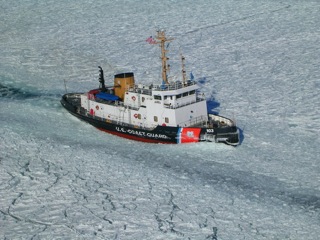Wind-packed ice on eastern Lake Superior delayed up to 18 vessels early this week, as U.S. and Canadian Coast Guard vessels renewed icebreaking operations, busting paths for ships to transit even as warming temperatures promised an end to the 2015 deep freeze.
The American cutters Mackinaw and Alder, and the Canadian cutter Samuel Risley, were joined in the operations Tuesday afternoon by Canadian cutter Pierre Radisson. All were breaking fresh tracks for vessels to transit to and from Superior and the lower lakes, according to the U.S. Coast Guard Ninth District headquarters in Cleveland.
“Everybody’s moving. When the Radisson came through that gave us the horsepower we needed. Everybody got out of Whitefish Bay…Traffic is moving under ice breaker escort,” said Mark Dobson, traffic manager at the Coast Guard’s Vessel Traffic Services St. Mary’s River in Sault Ste. Marie, Mich.
Lake Superior was still more than 75 percent ice covered near the end of March, and spring brought heavy winds that pushed ice packs east to jam up against still-frozen Whitefish Bay on the Michigan shore. There’s still concern that northwest winds forecast for late Friday could drive more ice down, but rain is expected too “and that will help speed up the melting,” Dobson said.
“Right now it’s manageable with the icebreakers. They’re trying to do daytime transits because there are a lot of big ice plates out there. They are just picking their way through,” he said.
The Coast Guard dubs its icebreaking operations Operation Taconite, named for the iron ore shipped on the lake’s bulkcarriers.
Other ice breakers are operating this week in the Straits of Mackinac, the lower St. Mary’s River and Georgian Bay to assist vessels and make channels, too, for “flushing” ice — creating open water so river currents can carry ice slabs out into open waters of the Great Lakes to melt as spring gathers.
Some news reports spoke of ships being stranded, but in fact “they were in a holding pattern, on standby” as the icebreakers did their work, said Senior Chief Alan Haraf, a Coast Guard spokesman. “Over the winter we had a few stuck in the Lake Huron-Erie area” and those vessels had to be freed by icebreakers, he said.




